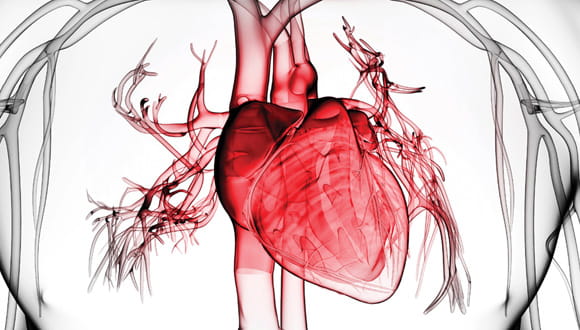At the beginning of the pandemic, COVID-19 was largely thought of as a respiratory illness. And while the virus can certainly wreak havoc on a person's airways and lungs, it's now clear that COVID-19 affects more than just the respiratory system.
"Fairly early during the pandemic, clinicians noticed that individuals with heart disease were more likely to develop severe COVID-19 than others. Not long after that, experts began to notice that severe COVID-19 can cause a variety of cardiac problems, including myocarditis, which is inflammation of a person's heart muscle. This is significant because myocarditis, when severe, can impact a person's health," explains Dr. Barry Trachtenberg, cardiologist and heart failure expert at Houston Methodist.
Dr. Trachtenberg is here to answer questions you may have about how COVID-19 specifically affects the heart.
Q: Why does heart disease increase a person's risk of severe infection?
Dr. Trachtenberg: For most people, COVID-19 is a mild illness that can be managed at home. Somewhere around 20% of infected individuals, however, develop severe symptoms and complications that increase the likelihood of hospitalization, and even death.
Of those who are more at risk for severe COVID-19 are individuals with pre-existing cardiovascular conditions, including:
- Heart failure
- Coronary artery disease (CAD)
- Cardiomyopathy
- Obesity
In addition, individuals may also be higher risk if they have high blood pressure (also called hypertension) — a very common condition that affects a person's blood vessels and heart.
Initially, it wasn't completely clear why having a heart condition makes a person more vulnerable to COVID-19. But our understanding of how this virus affects the body — specifically, the heart and vascular system — has grown tremendously over the last year. We now know that there are two prevailing reasons that heart disease is associated with a poorer COVID-19 prognosis.
First, a person with a weakened heart or vascular system is more vulnerable to the complications that can develop while ill with COVID-19. These complications include:
- Low blood pressure
- Low blood oxygen levels
- Heart rate changes that accompany fever
- Excessive inflammation
- Increased risk of blood clots
Even a healthy heart has to work very hard to help overcome these COVID-19-related complications, but — for a heart that's already struggling — these complications can easily become severe and turn deadly.
Second, heart disease is often accompanied by other health conditions that affect the overall function of the body, such as diabetes and obesity. For instance, obesity is shown to cause excessive inflammation, and diabetes increases a person's risk of developing blood clots — even in the absence of infection. While ill with COVID-19, it's believed that these pre-existing conditions likely further intensify the effects this virus can have on an already strained heart.
Q: How does COVID-19 affect a person's heart?
Dr. Trachtenberg: What we've learned is that COVID-19 can cause multi-organ damage, including both direct and indirect damage to a person's heart.
One way COVID-19 can affect the heart is by invading the heart muscle itself, causing inflammation within it and, in severe cases, even permanent damage — via muscle scarring or muscle cell death. This has been very controversial, however. While imaging data suggests that inflammation is happening, there are few documented cases where cardiac biopsy or autopsy clearly shows virus present in the heart with associated myocarditis. This may be, in part, due to the hesitancy to biopsy people who are contagious.
Inflammation can also accumulate in the heart as a result of a person's immune system overreacting to the infection, flooding the body with what's called a "cytokine storm." While less direct, this mechanism of damage is more common.
Regardless of whether it's caused directly or indirectly during coronavirus infection, inflammation within heart muscle is called myocarditis and is a common cause of heart failure.
There are several other ways the heart can be affected by COVID-19. For instance, if the lungs become inflamed or scarred, the right ventricle has to work harder to deliver blood to the lungs. This strain can impair the right ventricle, causing right-sided heart failure with fluid backing up into the liver and kidneys. It can also cause swelling and fluid accumulation in the legs and abdomen.
COVID-19 can also cause inflammation in the lining of the blood vessels that transport blood and nutrients throughout the body. This, ultimately, can lead to increased blood clot formation and a greater likelihood for these clots to stick to the walls of blood vessels, further increasing the risk of heart attack or stroke and potentially causing low blood oxygen levels.
If blood oxygen levels are affected and drop so low that the heart muscle is no longer receiving ample oxygen from the lungs, further damage to the heart occurs.
Lastly, any major stress to the body can cause stress cardiomyopathy, which mimics a heart attack but without blockages in the coronary arteries.
I will add that we've learned a tremendous amount about COVID-19 and the heart over the last year, thanks to the amazing dedication of scientists around the globe. However, there's still a lot that we are learning.
Q: What are the long-term implications of the heart damage caused by myocarditis from COVID-19?
Dr. Trachtenberg: Myocarditis is generally a rare phenomenon, and most patients make a complete recovery.
However, in some cases, severe myocarditis can cause permanent damage to the heart with long-term health implications that include:
- Heart failure
- Arrhythmia
- Increased risk of heart attack or stroke
The good news is that mild myocarditis generally has a very favorable prognosis, with most people making a complete recovery without any long-lasting effects on the heart.
What we don't yet know is whether this mild, asymptomatic myocarditis that can be seen via cardiac imaging in people who've recovered from severe COVID-19 will have long-term consequences. As mentioned, mild myocarditis typically has a promising prognosis. However, ongoing monitoring, particularly in individuals who are already more susceptible to myocarditis (such as athletes), is warranted.


